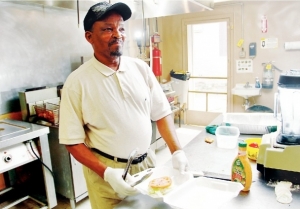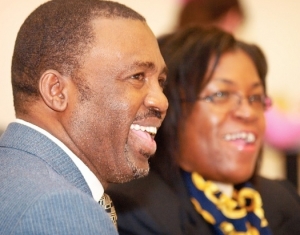Mount Olive's newest 'immigrants'
By Matthew Whittle
Published in News on May 8, 2011 1:50 AM

News-Argus/MICHAEL BETTS
Edgar Fragelus makes a Haitian lunch in his restaurant in downtown in Mount Olive. Fragelus is disappointed in the business he has seen since opening the restaurant. State Haitian community leaders hope Fragelus can make it through the hard time and turn his place into a meeting place for the Haitian community.

News-Argus/MICHAEL K. DAKOTA
A sudden influx of Haitians in Mount Olive has several networks talking to each other to find ways to bring new immigrants into the community. The Rev. Erilus St. Sauveur and Paulette Bekolo are part of a group of clergy who are working to make the Haitians' transition to North Carolina easier.
MOUNT OLIVE -- When Edgar Fragelus came to Mount Olive he thought he would be improving his situation. A restaurateur in Miami for nearly 25 years, he had seen his business slump in recent years. So when he heard that there were jobs in this small North Carolina town, he jumped at the chance to start over.
"The people were saying Mount Olive had the jobs. You could find them in North Carolina," said Fragelus, 61.
And while after a month of running Mount Olive's first and only Haitian restaurant, things aren't going quite as well as he had hoped, he is not too discouraged -- not yet. He knows from experience that these things take time and he believes he will ultimately be successful. After all, he has his community -- one that's swelled to about 2,000 in the region -- on his side.
However, said community leaders Paulette Bekolo, a tax professional and business consultant from Cary, and the Rev. Erilus St. Sauveur, pastor of Solid Rock First Haitian Tabernacle of Grace in Raleigh, while this new population is originally from Haiti, many of them with English still as their second language, all are either U.S. citizens or are otherwise here legally.
But they came hoping for better opportunities than they were finding available to them in Florida. And they hope that Fragelus' restaurant will not only succeed, but that it will be just the first of many Haitian-owned businesses in Mount Olive.
For now, though, they admit that things are tough -- that there is a significant need for better housing and transportation options, as well as jobs.
"It is not that easy for them," Sauveur said.
*
"It's slow now," Fragelus said.
With the exception of a few pickup orders, few people were in the small restaurant on East Main Street, and almost all were Haitian. In Miami, he said, he served about one American for every Haitian who walked in.
"Here's it's different. I've been surprised. American people, they don't come to see," he said.
And not helping matters is the fact that so many of the Haitians are currently unemployed and unable to afford to eat, even at the modest prices he's charging.
"Some are working. Some are not. Some are looking for jobs," he said.
Also not helping business, he acknowledged, is his location, just off the downtown path. He said that when he got the space he was expecting there to be at least a modest level of foot traffic, but that for most of the day, especially in the evenings, "I don't see nobody."
And that's a shame, he said, because he believes with his reasonable prices and good food, he has something to offer Mount Olive.
Among the dishes the restaurant offers, almost all of them $12 and under, are the seafood, especially the fried and boiled yellow tail and red snapper, goat, oxtail, fried pork, fried plantain and, of course, the red beans and rice. The seasoning, Fragelus said, is uniquely Haitian -- a mixture of African, French and Caribbean flavors -- and very different from anything else in eastern North Carolina.
"If people would just come here and try it, they're going to like it," Sauveur said.
*
Still, he said, with only a month of business under his belt, Fragelus, as well as Sauveur and Mrs. Bekolo are reluctant to draw any conclusions about how things will turn out for him and his family. But they know that his success or failure will be something of a barometer for the rest of the community's ability to stand on its own.
"He's our Christopher Columbus," Sauveur said.
"We're looking forward to opening many more businesses here," Mrs. Bekolo said. "Our job is to help people try to create their own businesses. We want to get a micro-loan system. We will run it for our community. We want to be self-sufficient."
What they're not looking for, she said, is a handout, or even help from groups who are using them primarily as an excuse to access government grants.
What they are looking for is support, space to operate and an opportunity to live out the American dream.
"They are not lazy people. They want to work here. They want to be busy," Sauveur said. "We're looking for jobs. They can work anywhere. This is a community we're trying to establish. If they have jobs, they will stay here."
And at least two to three times a week, especially on Wednesday afternoons, Mrs. Bekolo and Sauveur can be found at the restaurant meeting with different residents about various problems or concerns -- before heading the First Baptist Church for their Wednesday evening worship service.
"Their worship is the most important part for them," Mrs. Bekolo said.
The second most important part is having the restaurant where they can meet. And Haitians come from across the region, from as far away as Fayetteville, to get a little taste of home.
"This is a place Haitians can come to get together besides church," she said.
But while their own community is growing stronger, they also want to be accepted by the community that already exists in Mount Olive and to decrease the distance that still seems to be between them and even those who have made efforts to help them out.
"I still feel like there is that 'don't come close to me' attitude," Mrs. Bekolo said. "They want to help you, but they want you to stay in your corner. We still have a lot of work to do to raise awareness and let the community understand what we are as a new community."
